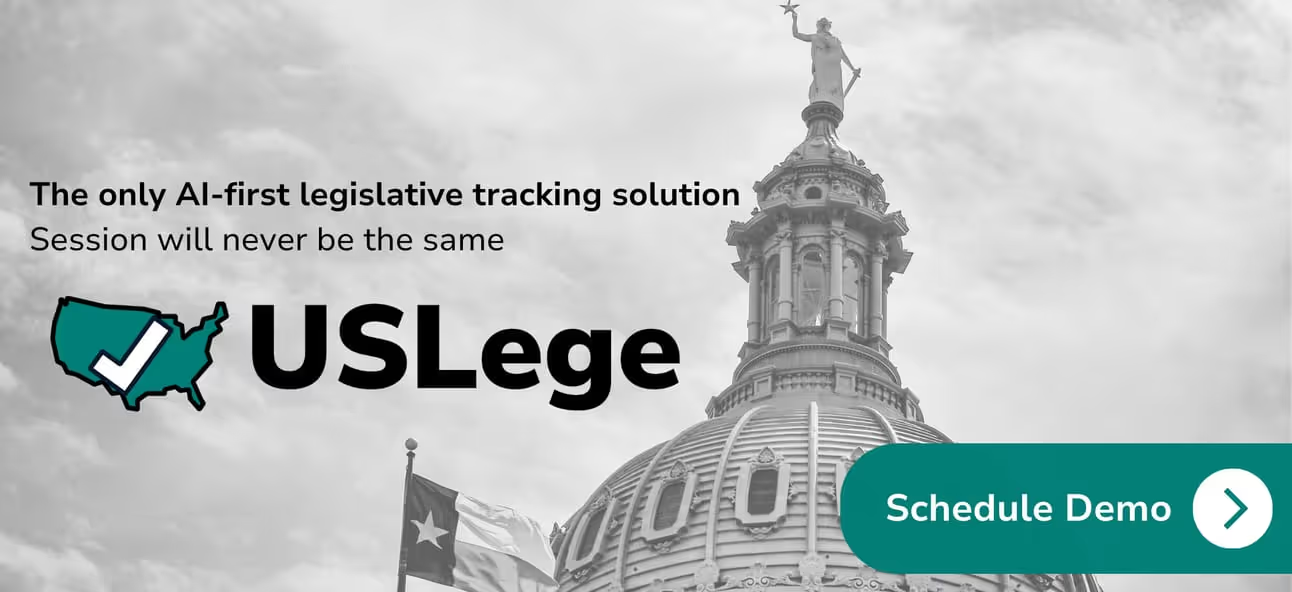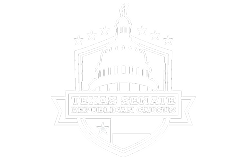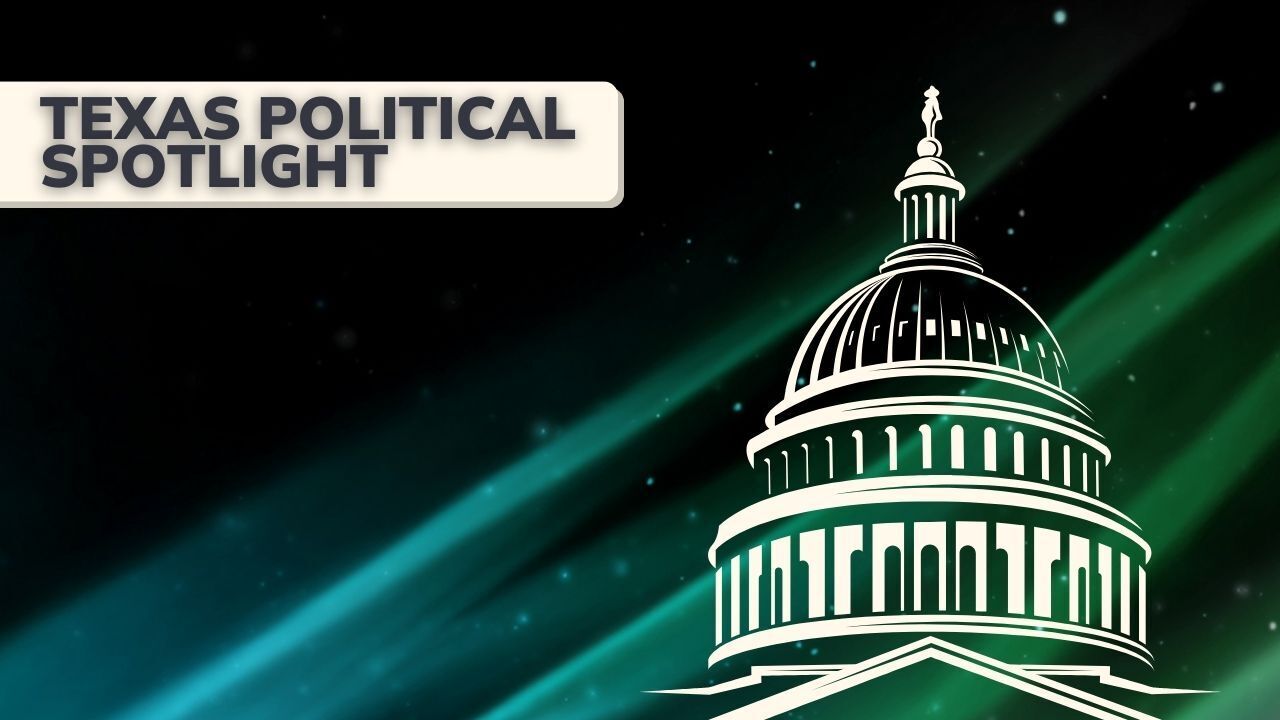
It’s called the Liar’s Dividend, and it’s a growing problem. This term, coined by Bobby Chesney, Dean of the University of Texas Law School, describes how bad actors erode trust online. Their goal isn’t just to influence you about a single candidate or issue, but to make you question everything you see online—even (and sometimes, especially) the truth.
Think of it as the Schrödinger’s Cat of political communication. Today, everything online is both true and false, and without a universally accepted standard for truth, there’s a significant opportunity for bad actors to spread falsehoods without consequence.
Consider this example: In 2024, Google’s Pixel 9 introduced a feature called “reimagine” for photos, allowing users to manipulate images—adding or removing elements at will. While this could be used optimistically to remove unwanted photo-bombers or include someone who was left out, the darker reality looms. As The Verge writer Sarah Jeong bluntly states: “We are fucked.”
Jeong explains:
“Everyone reading this article in 2024 grew up in an era when a photograph was, by default, a representation of truth. A staged scene with movie effects, a digital photo manipulation, or more recently a deepfake - these were potential deception to take into account, but they were outliers in the realm of possibility.”
Sarah Jeong, The Verge
But now with this tool and countless others like it, photographs no longer offer a realistic look at what took place at a particular moment in time. If photographs can’t be trusted, then what do we have left as objective historical reality? They say history is written by the victors; now it can be rewritten by anyone with a smartphone.
Regulating AI in Elections and Lobbying
These are the questions that state legislatures across the country are grappling with as they undertake the daunting task of regulating AI. But that begs the question…why isn’t the federal government doing something about it? Why is it being left to each state to decide?
“The Cavalry Isn’t Coming”
A former Federal Election Commission (FEC) attorney recently warned that the federal government is not prepared to regulate AI in elections. When the fake Biden robocall surfaced during this year’s primaries, the FCC tried to create rules to limit voice manipulation in robocalls. However, the FEC intervened, claiming jurisdiction over election-related issues. While the FEC’s involvement makes sense, it has yet to issue any rules, and none appear forthcoming. The reason? First Amendment concerns.
Many argue that regulations governing AI in elections would not withstand judicial scrutiny due to the expansive protections offered by the First Amendment. The constitution protects anonymous speech, false speech, and parody—all forms of expression implicated in AI-generated content for campaign ads. With a presidential election approaching, it’s also unlikely that Congress will act on AI regulation in time.
State Legislatures Taking Action
In contrast, state legislatures introduced as many as 50 AI-related bills a week in 2024, many focused on synthetic media.
Most states are still in the early stages of addressing AI’s impact. Their standard approach follows a pattern:
- Step 1 is to establish study committees to offer recommendations.
- Step 2 involves defining AI.
- Step 3 typically addresses criminal acts like deepfakes related to child pornography, revenge porn, or other illicit activities.
- Step 4 finally begins to address AI in the context of campaigning or lobbying.
The Step 4 approach involves requiring political campaigns to disclose when they use synthetic media in advertising. In response, some tech companies have started adding digital watermarks to AI-generated political ads, making them easier to identify.
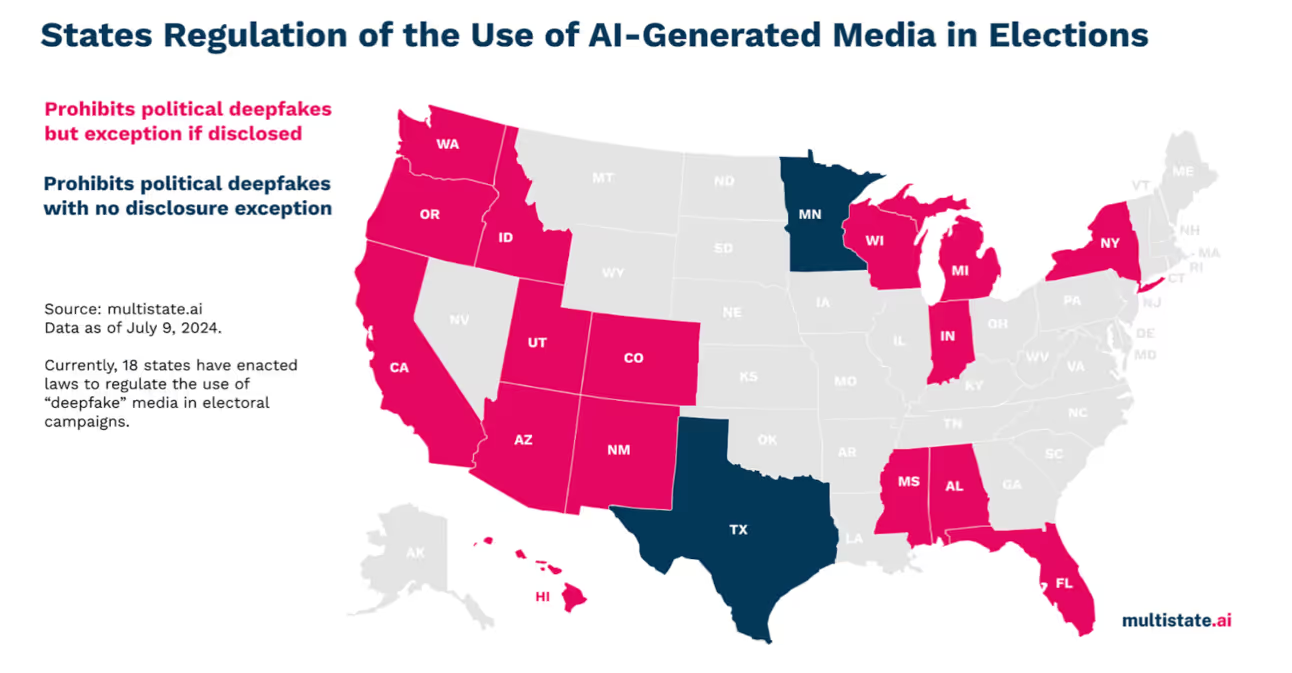
Texas and Minnesota currently have the strictest deepfake laws in the country, but these also have limitations. For example, Texas law states:
Sec. 255.004. TRUE SOURCE OF COMMUNICATION.
(c) An offense under this section is a Class A misdemeanor.
(d) A person commits an offense if the person, with intent to injure a candidate or influence the result of an election:
(1) creates a deepfake video; and
(2) causes the deepfake video to be published or distributed within 30 days of an election.
(e) In this section, "deep fake video" means a video, created with the intent to deceive, that appears to depict a real person performing an action that did not occur in reality.
Here we see that deep fake is limited to videos (does not include photos, voice or other sound manipulation, or depictions of fictitious events), and it is limited to the final month before election day. While innovative when passed five years ago, advances in AI have since exposed loopholes, enabling campaigns and opponents to easily circumvent these restrictions.
AI’s Role in Campaigns
AI is already transforming campaign operations in several key ways:
- AI Voice-Calling: AI can serve as a virtual campaign volunteer, making calls and engaging in natural-sounding conversations instead of following a rigid script. While this could revolutionize outreach, overuse may backfire if voters are bombarded with too many calls or texts.
- Campaign Strategy: Given basic race information (e.g., whether the race is competitive or under-the-radar, fundraising totals, etc.), AI tools can generate comprehensive strategy memos and update them as conditions change.
- Hyper-personalized Messaging: AI mines voter data, tailoring ads and outreach messages to individuals based on behavior, interests, and location.
These tools could revolutionize how campaigns connect with voters and could level the playing field between fledging campaigns and well-funded incumbents, but it also risks deepening the divide particularly if AI technology becomes too expensive for smaller campaigns to afford.
AI’s Impact on Lobbying
AI is also revolutionizing lobbying, where tools are being used for:
- Targeted Communication: AI assists in pinpointing key decision-makers and delivering tailored messages.
- Policy Monitoring and Prediction: AI tracks legislative changes and predicts the outcomes of pending bills.
- Influence Mapping: Algorithms can identify influential players in policy-making, helping lobbyists better target their efforts.
- Automation: AI automates administrative tasks, allowing lobbyists to focus on relationship-building—a fundamental aspect of lobbying.
However, the use of AI could also lead to laziness in lobbying, resulting in poorly drafted bills, inaccurate bill analyses, or even fabricated data that mislead legislators when pushing legislation.
USLege, Inc. is an example of how companies can use AI responsibly, by automating mundane, repetitive tasks while focusing on ethical and effective tools to help you work.
Conclusion: AI as a Tool, Not a Threat
They say AI won’t replace jobs— instead, those who use AI will replace those who don’t. Nowhere is this truer than in the high-stakes world of politics. But AI isn’t the enemy. With responsible regulation and ethical practices, AI can help refocus political communication on its core purpose—relationship-building and meaningful dialogue, which should always form the foundation of our democratic process.
Meet The Author
Andrew Cates is the Owner of Cates Legal Group PLLC, specializing in legal counsel for candidates, political action committees, and nonprofits in election and campaign law. He authored Texas Ethics Laws Annotated, the only comprehensive legal annotation of Texas campaign finance and lobby laws, now in its 8th edition. One of fewer than twenty U.S. attorneys with a certification in Legislative & Campaign Law, Andrew contributes frequently to news publications and serves as a founding faculty member at the Healing Politics Campaign School at Duke University. He also leads the Professional Advocacy Association of Texas. Previously, Andrew was General Counsel and Director of Government Affairs for the Texas Nurses Association, securing over $25 million in state funding to address the nurse shortage. He also served as legislative attorney for the Texas Association of REALTORS® and lead attorney for its PAC. Before his current role, Andrew worked at the Texas Capitol, lobbied for solar energy and healthcare, and practiced in areas such as mergers & acquisitions, healthcare, and criminal law. Andrew is a Founding Member and Board Member of the State Bar of Texas Legislative & Campaign Law Section and was instrumental in establishing the nation's first legal specialization in this field. He holds a B.A. in International Politics from Trinity University and a J.D. from Texas Tech School of Law (2007). Andrew is the General Counsel for USLege.
You can connect with Andrew through his website and LinkedIn.
🎙️We Have a Podcast! 🎙️
Bills and Business is your go-to podcast for conversations related to Texas legislation and business. Hosted by Laura Carr, Co-Founder of USLege—an AI-driven legislative tracking software—we bring you in-depth analysis on economic trends, impactful legislation, and key developments shaping Texas business.
Subscribe on Youtube and Spotify for weekly episodes!

- 01 First
Subscribe to our Newsletter

Read more news

Texas Political Spotlight

Welcome back, friends
Texas is facing a pivotal legal test over its election system as Republicans seek to end open primaries, a move that supporters frame as protecting party autonomy and critics warn could create new barriers to voter participation. At the same time, federal officials are considering a land exchange that would allow SpaceX to expand its South Texas launch site, renewing debate over how to balance economic growth with the preservation of sensitive wildlife habitat along the Gulf Coast. Lastly, a federal judge has blocked a new Texas law regulating children’s access to app stores, underscoring the ongoing uncertainty over how far states can go in policing online safety without infringing on constitutional rights.
.jpeg)
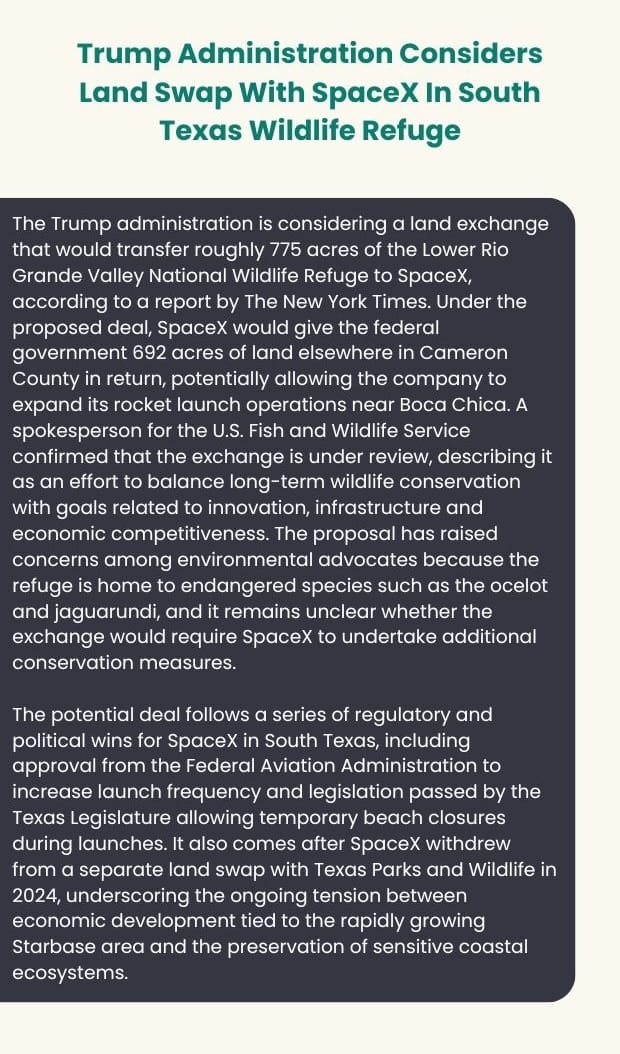
.jpeg)
We hope you enjoyed today’s read!
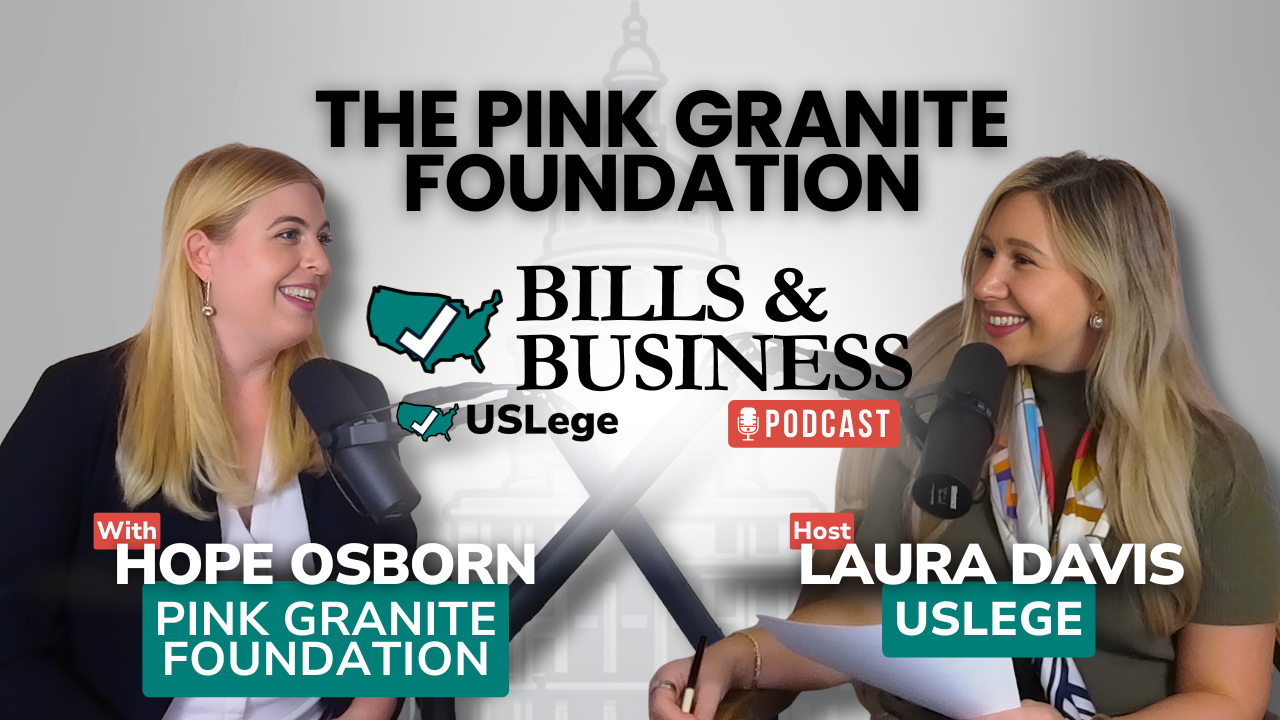
#44 - Hope Osborn: Building Community for Women in Texas Politics with Pink Granite
Welcome to Episode #44 of Bills & Business. In this episode, Laura Carr, Co-Founder of USLege, sits down with Hope Osborn, Co-Founder of The Pink Granite Foundation.
Hope brings more than a decade of experience across the Texas Capitol, having worked in both chambers, both parties, and in the advocacy world. She shares the story behind The Pink Granite Foundation and how it has grown into a nonpartisan force for uplifting, connecting, and supporting women in Texas politics. From its grassroots beginnings to the impact of the 2025 Pink Granite Party, Hope provides an inside look at how the organization strengthens the political ecosystem.
Laura and Hope explore the nonprofit’s mentorship programs, year-round community-building efforts, and the unique pressures women face working under the dome. Hope offers insight into why women’s leadership in politics matters, how to break down persistent barriers, and what the future looks like for the next generation of female leaders in Texas policymaking.
Don’t forget to subscribe to Bills & Business on Apple Podcasts, Spotify, and YouTube for more deep dives into Texas policy and business news.
📲 Follow Laura Carr
🐦 Twitter: @Laura_USLege https://x.com/Laura_USLege
💼 LinkedIn: https://www.linkedin.com/in/laurauslege/
📸 Instagram: https://www.instagram.com/thereallauracarr/
🛍️ ShopMy: https://shopmy.us/shop/lauraluise?Section_title=latest-finds&tab=collections
✍️ Substack: https://lauraluise.substack.com/
🔗 Links: https://lauraluise.carrd.co/
📲 Follow USLege
✨ Instagram: https://www.instagram.com/uslege.ai/
📘 Facebook: https://www.facebook.com/USLegeai
🐦 Twitter: @USLege_ai https://x.com/USLege_ai
💼 LinkedIn: https://www.linkedin.com/company/uslege-ai/
🎧 Subscribe to Bills & Business
🌐 Website: https://www.uslege.ai/
▶️ YouTube: https://www.youtube.com/@BillsandBusiness
🎵 Spotify: https://open.spotify.com/show/22ZWg9VVb2AEGqyV14osNi?si=effe3795f8414171
🍎 Apple Podcasts: https://podcasts.apple.com/ph/podcast/bills-and-business-by-uslege/id1781059329
🎥 TikTok: https://www.tiktok.com/@uslege
📲 Follow Hope Osborn
💼 LinkedIn: https://www.linkedin.com/in/hopeosborn/
🐦 Twitter: https://x.com/HopeOsbornTX
🎬 Produced by USLege
📞 Want to see USLege in action? Schedule a demo today! https://www.uslege.ai/demo

How to Choose the Right Legislative Bill Tracking Software for Your Organization
Legislative bill tracking software now sits at the center of how modern organizations monitor public policy.
With fast-moving legislation across states and at the federal level, even a single missed update can derail compliance, strategy, and stakeholder communication.
For government affairs, public affairs professionals, and policy professionals, the challenge is no longer finding information.
The real challenge is staying up to date, sorting through massive amounts of data, and acting fast enough to stay ahead of regulatory developments.
Organizations that still rely on manual tracking often miss hearing schedules, committee assignments, and vote movement during an active legislative session.
Those delays lead to rushed analysis, weak talking points, and reduced control over regulatory strategy.
This guide explains how modern legislative and regulatory tracking works, what features matter most, and how to evaluate legislative bill tracking software with confidence.
It also outlines how the right tools help organizations save time, stay informed, and work smarter with fewer resources.
What a Legislative Tracking Platform Actually Does
A legislative tracking platform collects bills, executive orders, and regulatory updates from Congress and state agencies.
It organizes full text, status, hearing schedules, and vote outcomes into a searchable structure.
Instead of searching dozens of sites, users access critical information in a single workspace.
This creates comprehensive coverage across jurisdictions and timeline stages.
Manual Monitoring vs Automated Systems
Manual tracking depends on email newsletters, website checks, spreadsheets, and delayed reports.
Automated tracking legislation systems rely on structured data feeds, continuous search processing, and AI-powered tagging.
This shift allows teams to track bills in real time while reducing reporting lag.
Who Relies on Legislative and Regulatory Tracking Every Day
Government Affairs Teams
Government affairs teams track legislation to advise internal leadership and shape outreach strategy.
They monitor committee hearings, regulatory changes, and voting calendars to anticipate outcomes.
Government Affairs Professionals
Government affairs professionals depend on real-time alerts to prepare briefings, manage stakeholder communication, and coordinate advocacy activity.
Public Affairs Professionals
Public affairs professionals use legislative tracking to stay informed on pending legislation that affects public positioning.
They use alerts, bill summaries, and reports to guide messaging and response timing.
Policy Professionals
Policy professionals analyze regulatory and legislative movement for forecasting and risk modeling.
Core Functions Every System Must Deliver
Real Time Alerts and Notifications
Real-time alerts ensure that no major event is missed.
Users receive status change alerts, hearing alerts, committee movement alerts, and vote alerts.
Many systems also deliver real-time legislative alerts and real-time notifications to multiple team members at once.
Email alerts remain a core communication channel.
Search and Filtering Tools
Strong search features allow users to search by keyword, bill number, sponsor, topic, and date.
Advanced filters allow professionals to track across Congress, agencies, and jurisdictions without manual sorting.
Bill Summaries and Full Text Access
Clear bill summaries help professionals review large volumes of legislation quickly.
Full text access supports detailed analysis when a deeper review is required.
Tracking Across the Full Legislative Process
The legislative process unfolds across many stages.
A strong tracking system follows every phase without delay.
Stages include introduction, committee hearing, committee vote, floor vote, reconciliation, and enactment.
Tracking each stage allows organizations to act with speed and precision.
Why Organizations Struggle Without Proper Tracking
Without reliable legislative tracking, organizations often miss key vote windows and fall behind on regulatory changes.
They lose early access to hearing schedules and waste time on manual legislative research.
Manual tracking also weakens stakeholder engagement and limits the ability to anticipate outcomes.
How AI-Powered Tracking Improves Speed and Accuracy
AI-powered systems classify bills by topic, industry, and risk level.
They reduce noise while increasing signal clarity.
Key AI-powered functions include automated tagging, predictive analysis, sentiment scoring, and impact forecasting.
This allows teams to anticipate policy shifts instead of reacting after passage.
Staying Ahead in Fast-Moving Legislative Environments
Fast-moving legislation often changes direction within days.
Organizations that stay ahead rely on continuous data intake and structured alerts.
To stay ahead consistently, teams must track daily activity, review bill movement, monitor committee assignments, and track hearing schedules.
Teams that do not stay ahead often miss early influence windows.
Jurisdictional Scope and Data Integrity
Federal Level Coverage
Federal-level tracking focuses on Congress, agencies, and executive orders.
These updates guide national strategy and compliance planning.
State and Local Monitoring
State and municipal legislation often moves faster than federal legislation.
Multi-jurisdiction tracking legislation tools allow organizations to track overlapping regulatory exposure while staying fully up to date.
The Role of Data in Modern Bill Monitoring
Data drives every element of tracking software.
It supports alerts, reports, dashboards, and compliance workflows.
Reliable data strengthens legislative analysis, regulatory monitoring, stakeholder analysis, and long-term strategy planning.
Reports, Analysis, and Action Planning
Strong report functions turn raw data into usable insights.
Reports guide leadership decisions at every level of the organization.
Common reports include daily legislative summaries, weekly regulatory reports, stakeholder briefings, and executive updates.
Advanced analysis allows teams to compare date ranges, sponsors, committees, and historical vote behavior.
Supporting Advocacy and Government Relations
Advocacy relies on early awareness and quick response.
Government relations teams depend on tracking to coordinate outreach tools, stakeholder engagement, and talking points.
Legislative tracking strengthens government relations by improving access to bill summaries, hearing schedules, and pending legislation updates.
Real Time Workflow Management
Real-time alerts flow into shared team workflows.
Every alert triggers review, analysis, and response.
Real-time notifications help assign internal owners, trigger review cycles, support rapid response, and prevent missed deadlines.
This structure allows the organization to maintain control under pressure.
Managing Regulatory Risk Through Continuous Monitoring
Regulatory risk increases when organizations track sporadically.
Continuous regulatory tracking reduces exposure by keeping leadership informed of regulatory changes.
Regulatory monitoring supports compliance alignment, internal controls, and audit readiness.
Integration With Internal Systems
Modern tracking software integrates with CRM systems, internal dashboards, compliance platforms, and reporting tools.
This improves access to legislative and regulatory data across the organization while reducing manual data entry.
Search, Review, and Control Functions
Search tools help teams locate relevant bills quickly.
Review workflows to ensure accuracy and relevance.
Control layers protect access across departments.
Key Evaluation Criteria for Selecting a Platform
Usability for Professionals
Professionals require intuitive dashboards, fast search, clear alerts, and low learning curves.
Usability directly impacts adoption and performance.
Customization for Each Organization
Every organization tracks different legislation.
Customization allows industry-specific focus, regional tracking, alert priorities, and tailored reports.
Cost, Spend, and Resource Allocation
Pricing affects total spend.
Automation reduces manual effort and helps teams save time while operating with less time investment.
Team Collaboration and Communication
Tracking systems support collaboration across the full team.
Shared alerts, shared reports, and shared review processes improve transparency and alignment.
Stakeholder Management and Client Communication
Stakeholders expect timely updates.
Clients rely on clear reports to guide compliance and planning.
Tracking platforms support stakeholder trust, client communication, and strategic confidence.
Avoiding Missed Opportunities and Compliance Failures
Organizations without structured tracking often miss hearings, deadlines, amendments, and engagement windows.
Every missed update increases both legal and operational risk.
Staying Informed in High-Volume Legislative Cycles
High-volume legislative sessions demand continuous monitoring.
To stay informed, teams rely on automated alerts, daily reports, and real-time legislative alerts.
Strategic Use of Legislative and Regulatory Tracking
Legislative and regulatory tracking supports long-term policy strategy, compliance planning, advocacy positioning, and organizational risk management.
Using Tracking to Anticipate Policy Shifts
Anticipation depends on trend analysis, sponsor behavior review, historical vote patterns, and committee movement tracking.
These insights help organizations remain one step ahead.
Managing High Bill Volume With Limited Resources
Congress and state legislatures introduce thousands of bills each year.
Tracking software allows organizations to manage this volume with fewer resources and stronger control.
Accuracy, Speed, and Critical Information Flow
Accuracy ensures trust in decisions.
Speed ensures timely action.
Critical information must flow without interruption to all stakeholders.
Supporting Long-Term Strategy With Continuous Data
Continuous data monitoring aligns regulatory planning with business strategy.
It prevents reactive behavior and supports proactive positioning.
Future Direction of Legislative and Regulatory Monitoring
The future is driven by deeper AI-powered analytics, faster real-time alerts, broader data interoperability, and stronger predictive analysis.
These advances will further improve organizational readiness.

Texas Political Spotlight

Welcome back, friends
Texas is facing a pivotal legal test over its election system as Republicans seek to end open primaries, a move that supporters frame as protecting party autonomy and critics warn could create new barriers to voter participation. At the same time, federal officials are considering a land exchange that would allow SpaceX to expand its South Texas launch site, renewing debate over how to balance economic growth with the preservation of sensitive wildlife habitat along the Gulf Coast. Lastly, a federal judge has blocked a new Texas law regulating children’s access to app stores, underscoring the ongoing uncertainty over how far states can go in policing online safety without infringing on constitutional rights.
.jpeg)

.jpeg)
We hope you enjoyed today’s read!
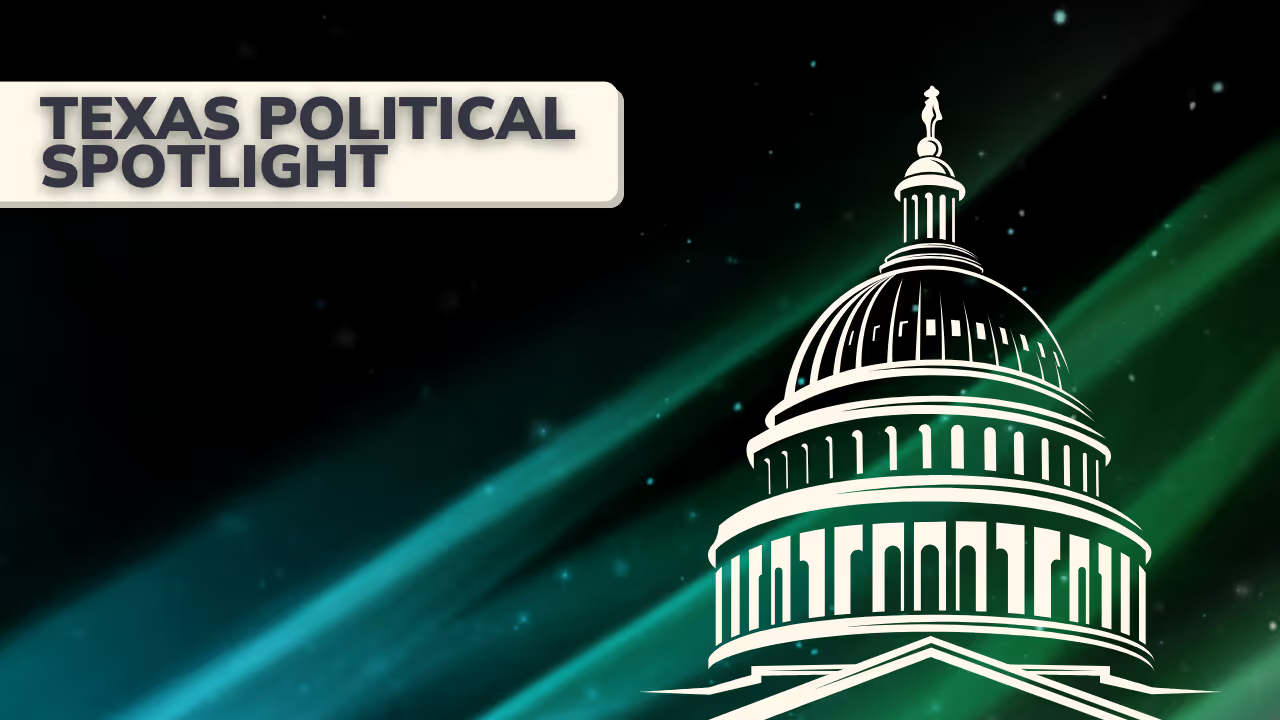
Texas Political Spotlight
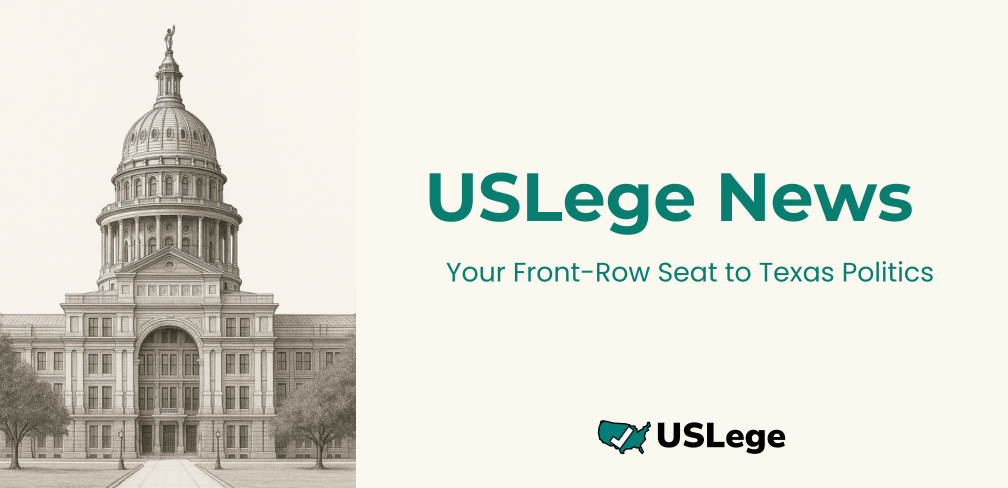
Welcome back, friends
Michael and Susan Dell’s unprecedented $6.25 billion pledge to expand federal “Trump Accounts” aims to boost long-term savings for 25 million American children. In Lubbock, Texas Tech’s new classroom restrictions on race, gender identity, and sexuality have ignited an immediate clash over academic freedom and curriculum control. And in Northeast Texas, Rep. Gary VanDeaver’s decision not to seek reelection opens a pivotal Republican primary.
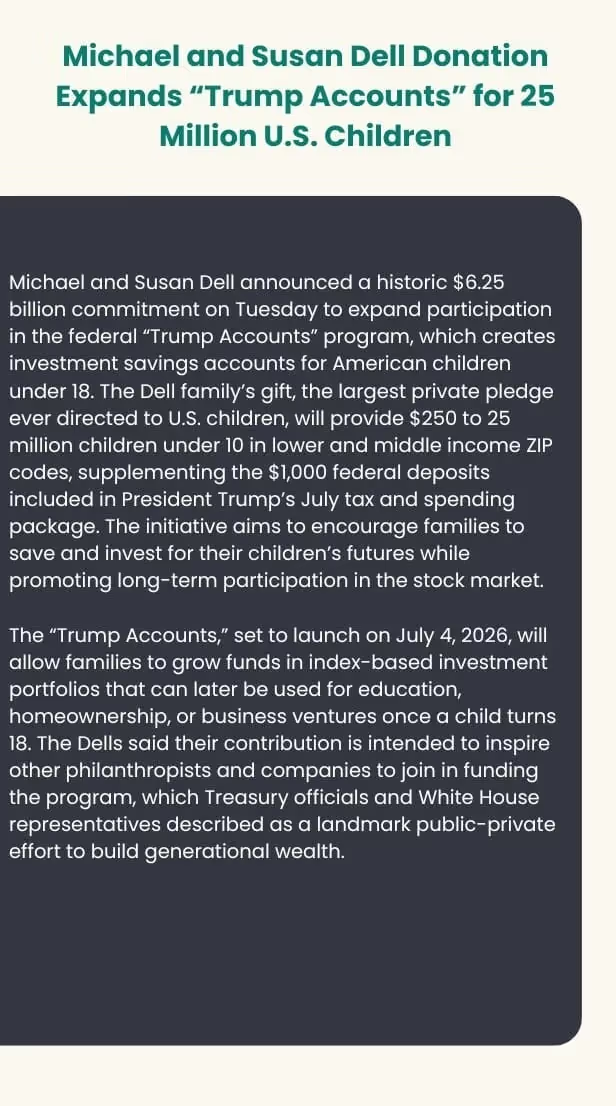
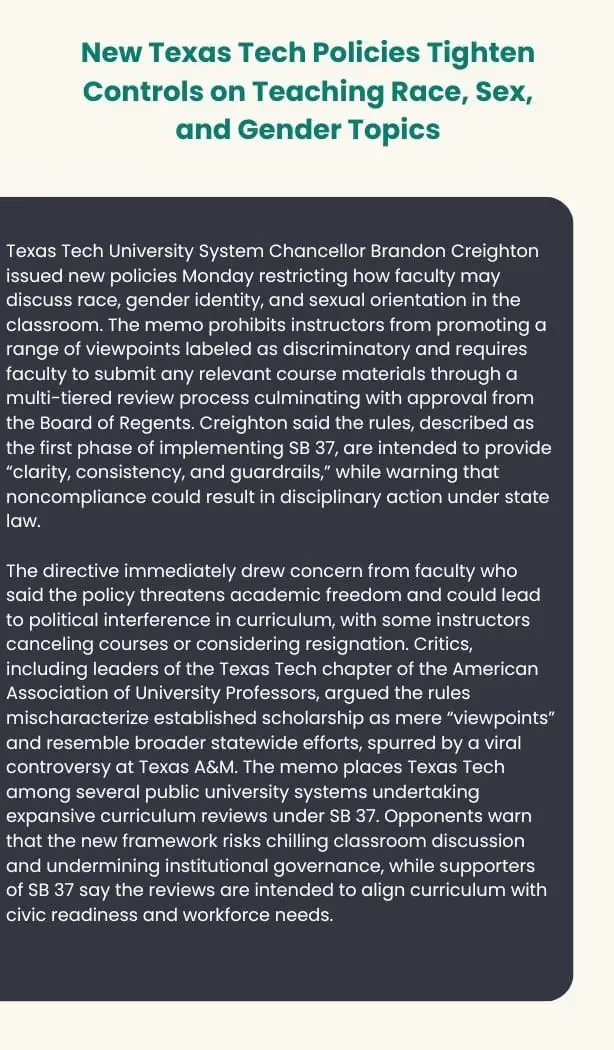
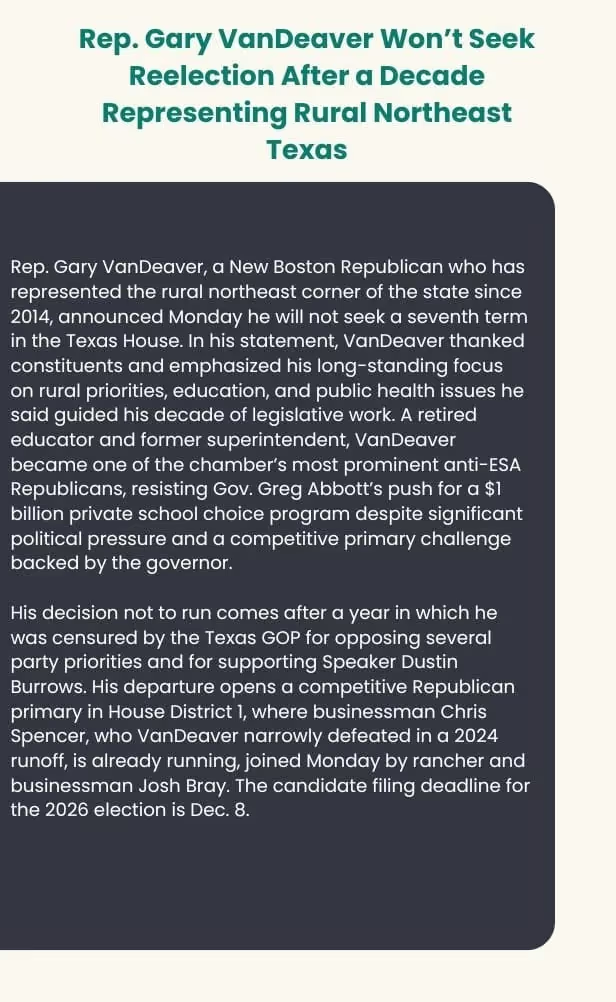
We hope you enjoyed today’s read!
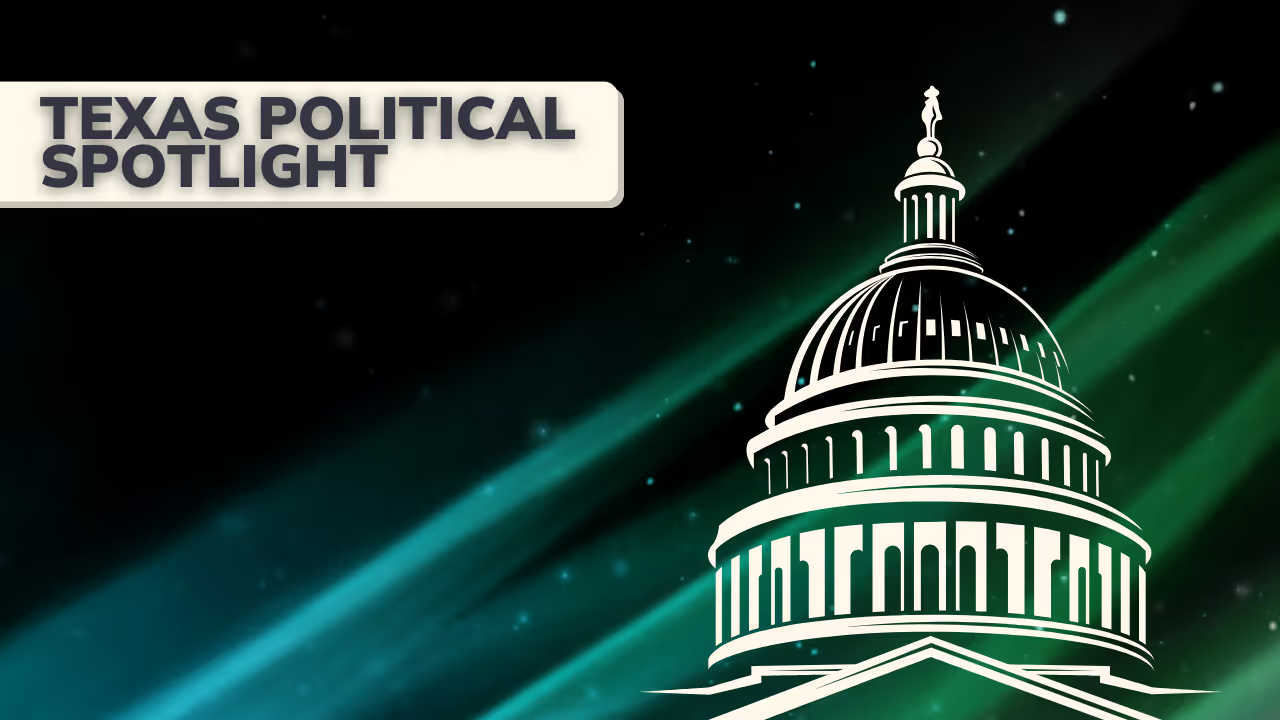
Texas Political Spotlight
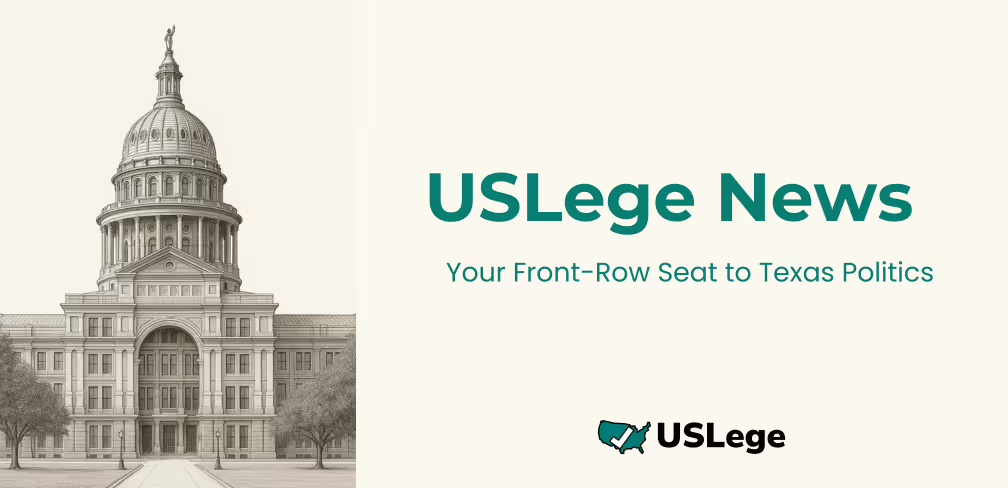
Welcome back, friends
Texas voters approved one of the largest property tax relief packages in state history on Tuesday, raising the homestead exemption to $140,000 and granting new tax breaks for seniors, people with disabilities, and small businesses. In Austin, residents rejected Proposition Q, a plan to fund public safety, homelessness programs, and city facility initiatives through a property tax hike, forcing city leaders to rework the budget and brace for service cuts. Meanwhile, Bexar County voters narrowly passed Propositions A and B, greenlighting up to $311 million in tourism-funded support for a new downtown Spurs arena and upgrades to the Freeman Coliseum grounds.
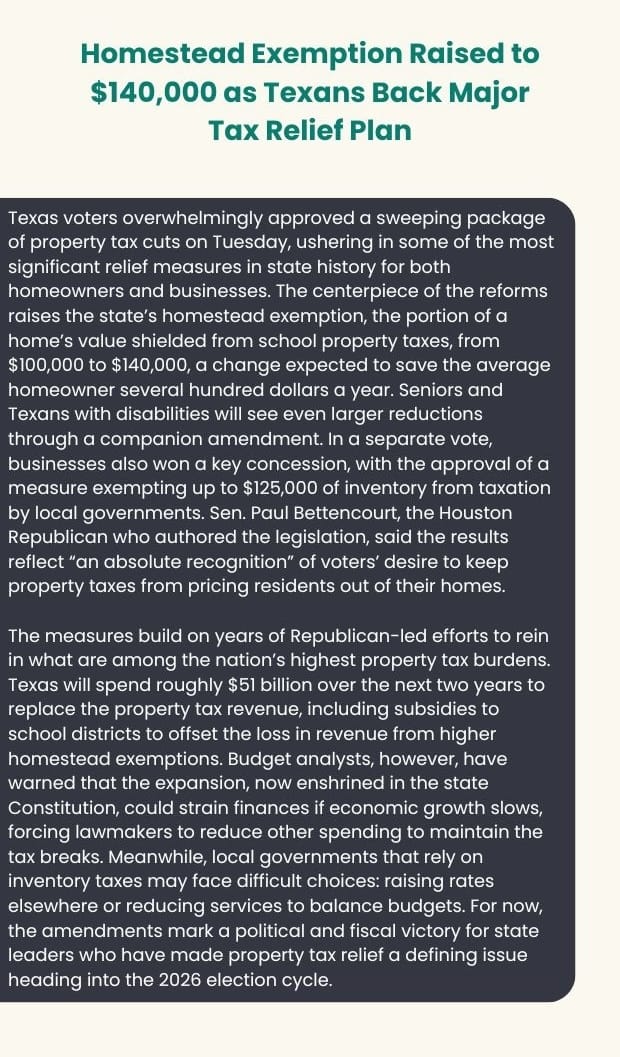
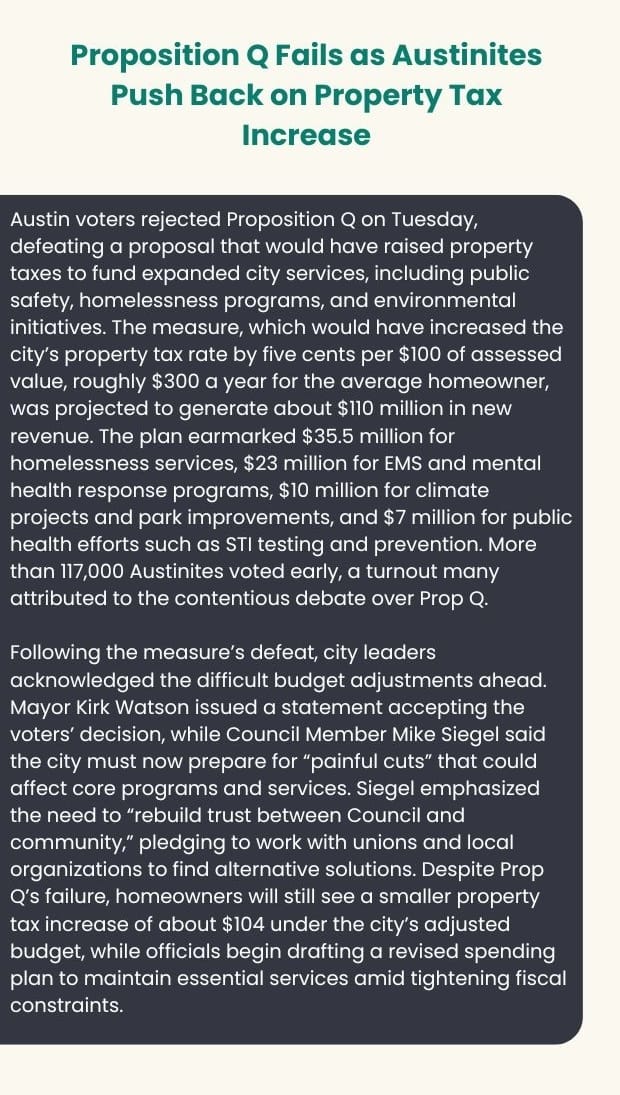
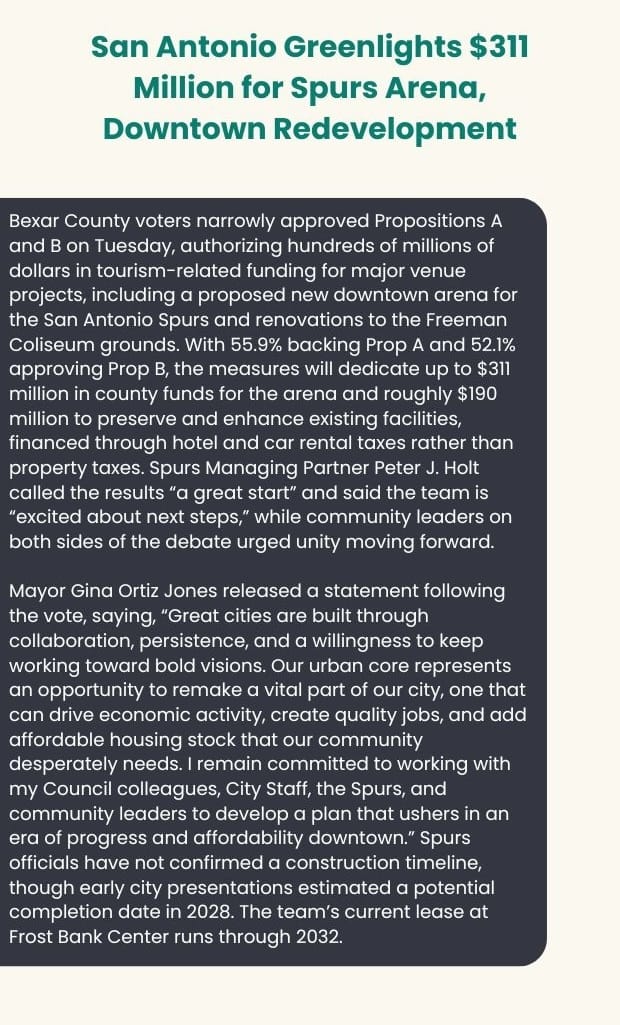
We hope you enjoyed today’s read!


